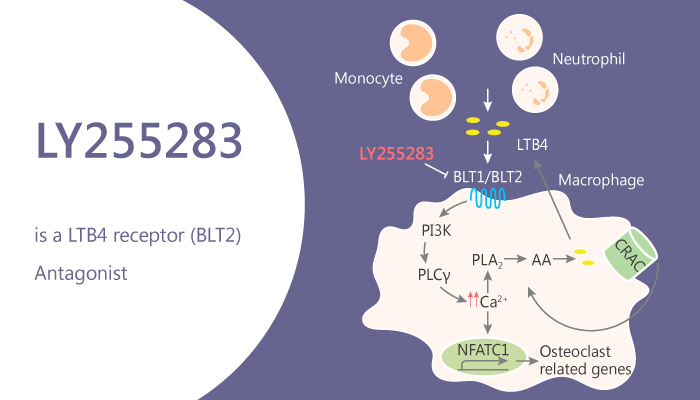Leukotriene B4 (LTB4) is a lipid mediator with potent chemoattractant properties. Activated innate immune cells such as neutrophils, macrophages, and mast cells rapidly generate LTB4. Ligation of BLT1 by LTB4 is important for the activation and recruitment of inflammatory cells. The inflammatory cells include neutrophils, eosinophils, monocytes/macrophages, mast cells, dendritic cells. The LTB4/BLT1 pathway appears to play an important role in the pathogenesis of severe persistent asthma. LY255283 is a LTB4 receptor antagonist.
LY255283 preferentially inhibits LTB4 induced activation responses over those induced by fMet-Leu-Phe and GM-CSF. Especially, LY255283 inhibits neutrophil aggregation induced by LTB4. In addition, LY255283 inhibits neutrophil functional activity by selective antagonism of LTB4 receptors.

LY255283 displaces [3H]LTB4 from its binding site on lung membranes with pKi value of 7.0. In the functional correlate of the binding studies, LY255283 competitively reduces contractile responses of lung parenchyma to LTB4 (pA2=7.2). In particular, LY255283 (administered i.v.) reduces LTB4 produced airway obstruction with an ED50 of 2.8 mg/kg). Moreover, LY255283 (administered orally) reduces LTB4 produced airway obstruction with an ED50 of 11.0 mg/kg). Furthermore, LY255283 selectively antagonizes pharmacologic responses to LTB4 on lung tissue and appears to be a useful tool to investigate the role of LTB4 in pulmonary disease.
The blockade of BLT2 with the specific antagonist LY255283 significantly suppresses the invasiveness of highly aggressive 253 J-BV bladder cancer cells. LY255283 treatment of 253 J-BV cells inhibits NF-κB DNA binding activity.
All in all, LY255283 is a LTB4 receptor antagonist, limits activation of neutrophils and prevents acute lung injury induced by endotoxin in pigs.